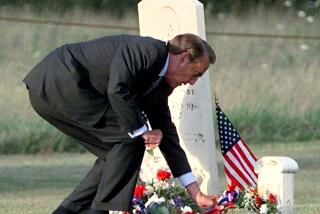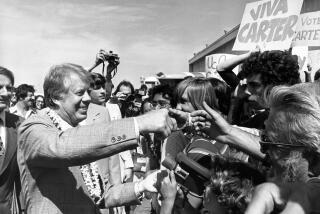Dole’s ‘Last Crusade’ Was Awkward Campaign of Compromises
- Share via
DES MOINES — After 35 years of distinguished public service, it all came down to this single scene: the former senator from the great state of Kansas, standing at the cusp of election day in an Iowa bowling alley, bashing Bill Clinton and asking for votes.
Bob Dole’s midnight warm-up act was Arizona Republican Sen. John McCain--friend, confidant and articulate interpreter for a quiet man with a sterling record who was forced to remake himself in painful ways in his final unsuccessful run for the White House:
“This is the last crusade of a great warrior, a member of a generation of Americans who went out and made the world safe for democracy,” McCain said Tuesday as a tearful Dole stood quietly behind him in the crush of a rally at the Air Lanes, “so that we could have lives that were far better for ourselves and our children.”
He was a giant in Congress, master of a legislative universe both intimate and powerful, a man whose record of accomplishment soured fast from asset to liability as the clock ran down on campaign ’96.
In the end, the self-proclaimed “most optimistic man in America” struggled with the age-old question of competition: Do you fight dirty and hope to win, or do you play it clean and protect your place in history?
Dole tried to do both and succeeded at neither, leaving an awkward montage of images in his final push for what he calls “the most powerful office, not just here, but in the world.”
Blaming Voters
There he is in Pensacola, Fla., in late October, blaming the voters for the predicament he is in, trailing badly behind a president whose character Dole constantly and openly disparaged in the final chapter of the campaign.
“I wonder sometimes what people are thinking about, or if people are thinking at all--if they really watched this administration, watched what’s happened in the White House, watched what’s happened in some of their policies, watched what’s happened when the president tells one thing and does precisely the other,” he fumed. “Time after time after time.”
The very next day at a Houston rally, the statesman with a history of good media relations lashes out on camera about a Fourth Estate that he claims simply does not care and, in fact, goes out of its way to pamper the president.
“Where is the outrage in America? Where is the outrage in America?” he demands, thumping the lectern with his fist. “Where has the media gone in America? Where is the outrage in America? . . . When will the American people rise up and say: ‘Forget the media in America. We’re going to make up our minds; you’re not going to make up our minds’?”
The weeklong outburst coincided with embarrassing revelations that Dole had not only sent campaign manager Scott Reed to Dallas to ask Reform Party candidate Ross Perot to drop out of the race and endorse the Republican--but that Perot had said no. The billionaire candidate called Dole’s entreaty “weird and inconsequential.”
Doles’ ‘Dynamic’
Shortly afterward, Elizabeth Hanford Dole largely left her solo campaign efforts on her husband’s behalf and joined him on the road for much of the duration. Campaign press secretary Nelson Warfield said their “positive dynamic” while campaigning together accounted for the doubling up.
With his wife at his side, the candidate calmed down and seemed to shift his focus to how history will remember him, wrapping himself in the mantle of presidents both living and dead. On Oct. 30, when the Doles left Washington for their final week on the campaign trail, they began the journey with a visit to the Lincoln Memorial.
After vowing to “win this election, Mr. Lincoln,” Dole told a Tennessee rally that “we are the party of Lincoln, and I’m proud of it.”
“I’ve read a lot about Lincoln,” he said. “I know the good times. The bad times. The doubtful times. But he never lost his focus. He did what he set out to do, and that was to save the union and keep us together. That’s what I am continuing to try to do: Keep America together. Honor the public trust.”
Tax Code Reformer
For 35 years, Dole did just that, at least in the legislative arena. As the longest-serving Republican leader in the history of the Senate, Dole championed the rights of disabled Americans, helped rescue Social Security and fought to cut the deficit.
He stood by the GIs in Vietnam through the tumultuous 1960s, reformed the tax code, supported civil rights, defended food stamps and led the efforts to honor Dr. Martin Luther King Jr. with a national holiday.
That legacy could have been Dole’s greatest asset in his third and final run for the White House. But as he changed his positions on a host of key issues in an effort to broaden his appeal, the taciturn plain-speaker was singularly unable to finesse the flip-flops to the satisfaction of the voters.
Each time he tried to articulate a new position, such as why he no longer believed in affirmative action or why he was suddenly embracing supply-side economics, Dole was unconvincing.
Instead of changing minds, he largely fanned skepticism, unable to avoid the appearance of engaging in election-year pandering. In the end, the man who campaigned on trust had squandered what might have been his greatest appeal: moral rectitude. He came across as a man without core beliefs.
At the final rally of his 20-month run for the White House--a 3 a.m. extravaganza Tuesday in front of Harry S. Truman’s statue in historic Independence, Mo.--Dole laid out a laundry list of the ideals for which he said he stood.
He would end quotas and preferences, lead the fight against illegal immigration and cut taxes, he told several thousand chilly but cheering supporters.
“These are the beliefs I hold and the values I honor,” he said. “They are the lessons of a lifetime.”
Embrace of Tax Cut
Actually, they were the lessons of a brutal campaign that saw him turn away from his center--hard-fought over decades in American government--issues that he turned to only in the final months of his presidential bid, pushed by advisors and lagging in the polls.
Perhaps Dole’s biggest election-year conversion was his embrace of a broad tax rate cut, something he felt so strongly against over the years that, while seeking the 1980 GOP nomination, he refused during the New Hampshire primary to sign a pledge vowing never to raise taxes.
Indeed Dole had been so intent on cutting the deficit that he backed countless tax hikes--prompting Rep. Newt Gingrich (R-Ga.) to belittle him then as a “tax collector for the welfare state.”
In Independence on Tuesday, Dole focused again on his new economic stance, telling supporters that “I will cut taxes across the board because I believe Americans send too much of their paycheck to the government in taxes.”
Seven hours later he was heading to Russell, Kan., en route to a date with the voting booth. Aboard Dole’s campaign plane, Citizen’s Ship, McCain told reporters that the candidate will be remembered as “part of that institution,” the Senate.
“It was a detriment in the presidential campaign because his whole life in the Senate was to reach conclusions that required compromise, when in campaigns, the whole job is to draw bright lines,” McCain said. “If he loses, it will be because he achieved a level of trust and confidence of his colleagues that puts him up there” with the greats, like Truman, Hubert H. Humphrey and Howard H. Baker Jr.
Dole, said McCain, was not reflecting on such weighty matters when he made his way toward Russell on Tuesday.
It was the end of a long, hard journey, a campaign that Dole has said he will not repeat. After traveling throughout the country in a four-day flurry of nearly nonstop appearances, he was home. “I’ve voted before here a lot, but never voted for myself for president,” he said. “I was a little nervous.”
More to Read
Get the L.A. Times Politics newsletter
Deeply reported insights into legislation, politics and policy from Sacramento, Washington and beyond. In your inbox twice per week.
You may occasionally receive promotional content from the Los Angeles Times.










